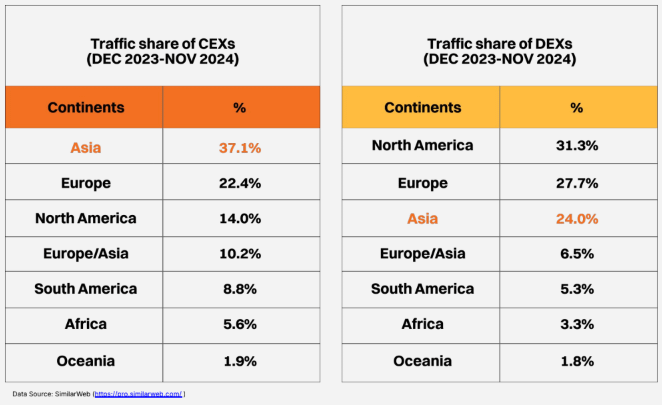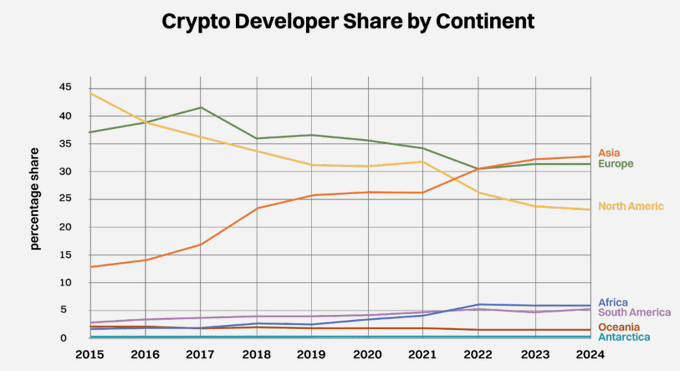Strong leaders in the Asia-Pacific region can help assess the leadership potential of founders and teams in the global market.
Author: Primitive Ventures
Compiled by: Deep Tide TechFlow

Asia is a significant market in the cryptocurrency space, accounting for 60% of global users and contributing 37% of centralized exchange (CEX) traffic.
Asia has a population of 4.8 billion, representing 60% of the world's total population. As a contributor to 40% of global GDP, Asia's economic scale is not to be underestimated, and the median age of its population is only 32, showcasing a young and vibrant characteristic. With over 2.8 billion active internet users, Asia has become the center of on-chain activity—from creative decentralized application (dapps) developers to active participants and "airdrop hunters" in the market. Nevertheless, Asia remains the most underserved region, yet it is also the easiest market to expand into due to its immense potential.
Summary
Plan the Asia-Pacific (APAC) strategy in advance, led by a local "hero" who understands the landscape.
Avoid outsourcing to third-party agencies, "local consultants," or ambassadors; instead, directly hire a local General Manager (GM) who reports directly to the founder.
An excellent APAC leader should be judged by their actions and results, not just their resume or self-promotion. Many outstanding talents may come from grassroots, are experienced and pragmatic, but may not be active on Crypto Twitter or have impressive LinkedIn profiles.
Prioritize localization in the go-to-market (GTM) strategy to fully leverage local unique advantages, especially when the project name is difficult to pronounce in Chinese or Korean.
Strong APAC leaders can help assess the leadership potential of founders and teams in the global market. They can quickly determine whether you are serious about the local market and possess a clear strategic vision.
Cryptocurrency is a truly globalized industry. Its asset class enables 24/7 trading without breaks, transcending time zone limitations and legal boundaries. This around-the-clock, borderless characteristic is one of the core advantages of cryptocurrency. Cryptocurrency is not only digital-first but also internationalization-first, with participants from around the world driving the development of on-chain economies and communities.
This international characteristic is particularly evident in Asia. Some of the earliest Bitcoin miners came from China, which is no coincidence.
Today, Asian exchanges dominate the highest retail trading volume globally.

Over time, other cryptocurrency hubs in Asia have gradually emerged. From Hong Kong's role as a traditional financial center to Singapore attracting founders with its forward-looking regulatory framework, and to South Korea's enthusiastic retail market, Asia has always played a significant role in the growth and cultural evolution of cryptocurrency. Even places like Malaysia, Vietnam, Thailand, and Indonesia have thriving developer communities and rich offline activities.

However, the complex and diverse cultures, languages, regulations, and local market dynamics in Asia make expansion efforts challenging. To truly succeed in the Asian market, it is not enough to visit occasionally or hire an agency familiar with the regional knowledge, especially for teams lacking an Asian background.
At Primitive Ventures (PV), we have been committed to bridging the gap between Western and Eastern cryptocurrency markets since our inception. We often receive inquiries from portfolio companies outside Asia on how to successfully recruit an excellent APAC leader.
In this article, we will break down some key advice for founders to help them establish successful businesses in the Asia-Pacific (APAC) region. Here are several key points we will explore:
When do you need to recruit an APAC leader?
How to find the ideal APAC leader?
What kind of talent makes an excellent APAC leader?
What are common pitfalls when entering the APAC market?
How to understand local work culture and business norms?
When do you need to recruit an APAC leader?
Don't rush. Before starting the search for an APAC leader, begin with the fundamental question of why APAC is crucial for your project. What are your goals—attracting developer participation, increasing liquidity, expanding community size, or seeking strategic partners? Don't blindly follow others who are active in the Asian market without deeply understanding your product positioning and market needs.
Generally speaking, it is best to establish some credibility in your core market first. You do not need to be the industry leader in Western markets, nor do you need a fully mature business, but you should at least have some recognition. For example, gaining support from well-known investors, successful pilot projects, or a clear product roadmap can help you earn trust in the Asian market. The cryptocurrency community in Asia places a high value on trust and credibility: well-known partners, successful cases, and the fit between product and market are all important criteria for evaluating projects.
If your project is still in its early stages, it may not be suitable to invest resources in the APAC market too early. The best timing is usually between the mid-development phase of the project and the pre-launch Token Generation Event (TGE). This period allows your APAC team enough time to prepare, including organizing events, connecting with local developers, planning collaborations with key opinion leaders (KOLs), and enhancing brand awareness before officially entering the market. Starting too early may waste resources; starting too late may miss the opportunity to establish a foothold in the market.
Where to find the ideal APAC leader?
Initial market positioning: First, try to establish influence in the Asia-Pacific region. You can participate in local industry conferences, translate your project's core documents into local languages, or collaborate with organizers of small events for brand exposure. Establishing initial brand recognition in the Asian market is crucial, as it not only enhances your project's visibility but also attracts suitable candidates for future recruitment.
Discover from the community: If possible, prioritize recruiting talent from your project's community. Those familiar with the project's culture and mission are often better suited as APAC leaders, as they can bring localized insights and a strong sense of belonging to the team.
Leverage local venture capital networks: Venture capital firms in the Asia-Pacific region often have rich talent resource networks. They can recommend candidates with similar experience, such as those who have successfully established exchange partnerships, collaborated with local developers, or organized community events.
We conducted a quick survey of 10 APAC practitioners to understand how they learned about their current positions: 1/10 were introduced by headhunters, 5/10 knew the team beforehand, 2/10 were recommended by investors, 1/10 applied on their own, and another 1/10 came from community recommendations.
What kind of talent makes an excellent APAC leader?
An excellent APAC leader needs to be able to identify and acquire the key resources required by the project at different stages of development. They are not only resource integrators but also relationship builders and strategic thinkers. Their effectiveness often depends on their ability to acquire and transform these resources.
Liquidity: In the cryptocurrency industry, liquidity is one of the hardest resources to acquire. This requires establishing deep partnerships with centralized exchanges (CEX) while uncovering hidden purchasing power within the region. Since these resources are often obscure, it takes extensive industry experience and a broad network to successfully master them.
Marketing and community: Brand building and community culture shaping are usually led by headquarters, and localization alone is often insufficient. In the APAC region, collaboration with media and key opinion leaders (KOLs) is relatively common. The key is to choose the most suitable channels for each event to maximize the brand's market impact.
Business Development (BD): The BD role requires a high level of engagement, focusing on building long-term relationships with developers and local partners. This work requires significant time and effort to develop a loyal user base. The core value of the BD team lies in fundraising and go-to-market (GTM) strategies. While many local teams excel in product development, they often struggle to connect with top Western venture capital firms. A successful BD team also needs to bridge cultural differences, helping local teams access and integrate into the global market.
Institutional resources: Although institutional resources are somewhat standardized, trust remains a key factor. Ultimately, the decision to collaborate often hinges on strong product capabilities and appropriate incentive mechanisms, which can naturally attract institutional partners.
In short, while acquiring marketing and Total Value Locked (TVL) resources is relatively straightforward, business development (BD) requires refined operational capabilities. In the APAC strategy, the most challenging and crucial part remains securing sufficient liquidity for the Token Generation Event (TGE).
Common pitfalls when entering the APAC market
Lack of clear objectives: Before entering the APAC market, you need to be clear about your goals. Are you looking to attract regular users, integrate into the developer ecosystem, or seek institutional investors? Different objectives require different market strategies and approaches. Be sure to define your core needs and direction before recruiting an APAC leader.
Choosing the wrong agency: There are many agencies in the market claiming to help you enter the APAC market, but not all agencies are trustworthy. Especially those that do not focus on a specific country but claim to cover multiple culturally diverse Asian markets often lack depth. Localization remains a key advantage. In contrast, an agency that truly specializes in one or two specific markets is usually more valuable than those that take a broad approach.
Misconceptions about remote management: Don’t assume you can easily manage the APAC market remotely. Flying in once a year or relying entirely on remote command is nearly impossible. You need a dedicated local team that can respond to market changes in real-time, not just a remote contact.
Viewing the APAC market as a single entity: APAC is not a unified market. From South Korea, Japan, and China to Southeast Asia, each country has its unique language, culture, and incentive mechanisms. In the cryptocurrency space, each country has its strengths and weaknesses. Your APAC leader should be able to understand the nuances of these differences or at least have good local relationships in these regions to better address diverse market needs. Attempting to cover the entire Asia-Pacific market with a "one-size-fits-all" approach is not only unlikely to succeed but may also lead to wasted resources or strategic missteps.
When entering the APAC market, it is essential to develop personalized strategies based on the characteristics of different countries while ensuring the team has a deep understanding of the local market's culture and operations.
Understanding work culture and business norms
It is important to remind again that APAC is a vast and diverse region. Each country has its unique business culture, but overall, it tends to be more relationship- and trust-based rather than purely transactional. This approach contrasts sharply with some more direct Western business models.
Therefore, finding an APAC leader who truly understands these cultural differences is crucial. They need to possess excellent social skills to build good interactive relationships with people from different backgrounds and international environments. This is very important because what is considered respectful behavior in one country may seem inappropriate in another. Learning to find a balance between being straightforward and respecting others is an important step toward success in the APAC market.
An ideal APAC leader not only needs to have a deep strategic understanding of the entire cryptocurrency market but also must possess strong business networking skills, able to adapt flexibly and genuinely integrate into the business culture of different regions. This comprehensive ability will help businesses build trust, win cooperation, and achieve long-term development in the diverse Asia-Pacific market.
免责声明:本文章仅代表作者个人观点,不代表本平台的立场和观点。本文章仅供信息分享,不构成对任何人的任何投资建议。用户与作者之间的任何争议,与本平台无关。如网页中刊载的文章或图片涉及侵权,请提供相关的权利证明和身份证明发送邮件到support@aicoin.com,本平台相关工作人员将会进行核查。



